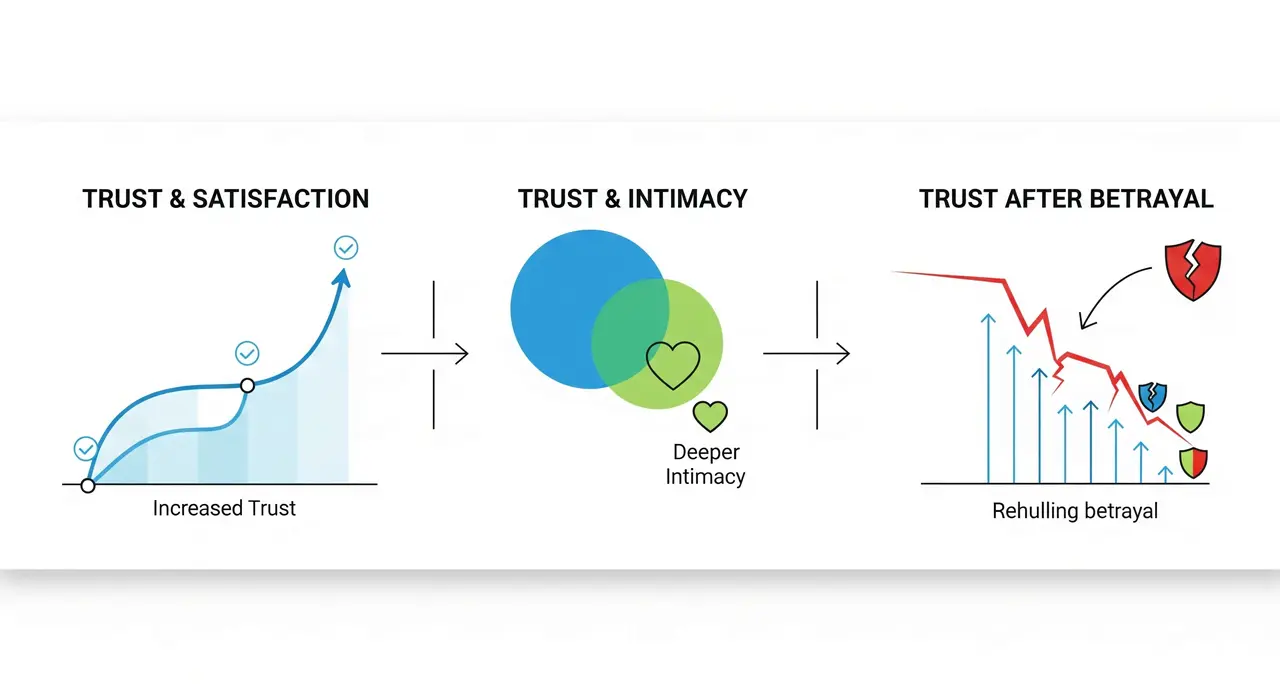How To Build Trust in Relationships?

How do you build trust in relationships? It starts with small, consistent actions. Being honest, keeping your word, and respecting each other’s boundaries matter most.
Trust grows when you listen, show empathy, and make your partner feel safe. It’s not instant; it’s built day by day through how you show up for each other.
Below we look deeper into this topic:
As Sabrina Romanoff, PsyD, a seasoned clinical psychologist, puts it, trust forms the solid foundation of any romantic relationship.
To build trust in a relationship means to open your heart without fearing betrayal or hurt. It means being honest with each other, honoring promises, and allowing vulnerability to enrich your connection.
Lack of trust can lead to a fractured relationship, whereas learning how to rebuild trust can transform a troubled connection into a thriving partnership.
Discover Your Inner Self. Join Our Self-Mastery Program.
Self-Mastery Coaching gives you the space, tools, and guidance to grow, reflect and discover your values and inner strength.

Why Trust Matters in Relationships?
Trust matters in relationships because it is the core ingredient that makes safety, intimacy, and long-term satisfaction possible, while a lack of trust quickly erodes connection, communication, and commitment over time.
Trust grows through repeated, reliable behavior, especially in vulnerable moments, and predicts whether a relationship will feel like a safe haven or a source of stress.
Why trust is foundational
research shows Trust is A Major Factor
How trust deepens intimacy
The cost of broken trust
Quick comparison table
| Topic | Why it matters | Key takeaway |
|---|---|---|
| Trust and satisfaction | Higher trust correlates with higher relationship satisfaction across samples. | Invest in reliability to raise long-term satisfaction. |
| Trust and intimacy | Trust enables honest disclosure and responsive support, deepening closeness. | Intimacy follows safety; safety follows trust. |
| After betrayal | Trust ruptures can trigger trauma-like symptoms and long-term guardedness. | Repair needs time, transparency, and repeated reliability. |
Healthy relationships are built on a simple loop: reliability builds trust, trust enables intimacy, and intimacy fuels satisfaction and commitment.
Without trust, relationships stall under anxiety and doubt; with trust, they become resilient, connected, and future-facing.

How Trust Issues Shake the Relationship Foundation
Trust is the lifeline of any meaningful connection, and when it cracks, the entire relationship can crumble. The absence of trust is not merely a flaw in a relationship; it’s a wound that can fester. Here’s how the lack of trust can infiltrate various aspects of your relationship:
1. Deterioration of Intimacy
Trust issues in a relationship cause a significant decline in emotional and physical closeness. When deceit takes the place of honesty, distance grows, leaving intimacy gasping for breath.
2. Pervasive Negativity
A partner’s betrayal or lack of honesty breeds anger and resentment. The negativity stifles connection and can turn love into a battlefield.
3. Insecurity and Control
Insecurity is a silent killer in a relationship, leading to doubt and, paradoxically, behaviors designed to gain control that only push partners further away. Trust builds a bridge; lack of trust burns it down.
Subscribe to Create Higher Vibrations!
Get Inspiration and Practical advice straight to your inbox.
4. Emotional Strain: Depression and Anxiety
The failure to rebuild trust or an ongoing deceit leads to mental turmoil. Anxiety, depression, and constant questioning of your partner’s intentions become haunting ghosts in the relationship.
5. Trouble Focusing
The turmoil doesn’t stop at the relationship’s door. Lack of trust can consume your thoughts, making concentration on daily tasks a struggle.
6. A Symphony of Distress
Trust, once broken, contributes to a whirlpool of emotional and physical distress. Betrayal, trauma, emotional dysregulation – these become the dissonant notes in what was once a harmonious love song.
7. Fear and Loneliness
Low trust transforms love into fear and companionship into loneliness. The fear of the unknown, paired with the isolation that distrust creates, turns the relationship into a cold, unfamiliar place.
In the wise words of Sabrina Romanoff, PsyD, “Repeated violations or consistent hurtful behaviors erode trust.“ Whether it’s in a marriage or a romantic relationship, the impact of a lack of trust is profound and devastating.
Rebuilding trust takes effort, understanding, and sometimes professional help from relationship experts. Without it, the relationship can feel like a house without a foundation, unstable and ready to collapse.
The importance of trust in relationships is undeniable; it’s the cement that holds the structure together. Without it, all that’s left are the ruins of what could have been a beautiful love story.
Strategies to Build Trust With A Partner
Trust is not a static element in a relationship; it’s a living, breathing bond that needs nourishment and care.
Just as a plant requires water and sunlight, trust needs specific nurturing actions. Here’s how you can fortify and deepen the trust in your relationship:

1. Embrace Mistakes as Learning Opportunities
Mistakes happen, and they can hurt. But what sets a growing relationship apart is how both partners respond to those mistakes.
Owning up to errors, learning from them, and showing how to do better in the future turns a mistake into a stepping stone towards a deeper connection.
2. Cultivate a Culture of Open Communication
Open communication is the heartbeat of trust in relationships. It’s not just about speaking; it’s about listening and creating a safe space where both partners can share without judgment. Transparency and honesty breed trust; secrecy erodes it.
3. Build and Maintain a Consistent Behavior Pattern
Trust grows with consistency. Being reliable and following through on promises is a silent, yet powerful, way to build trust through vulnerability.
Consistency builds a strong foundation of trust and creates a relationship that feels safe and secure.

4. Explore Emotional Triggers and Rebuild Together
Sometimes, mistrust has deep roots in past relationships or personal fears. Recognizing and exploring these triggers with your partner helps to understand and heal them.
It’s a journey that requires empathy, patience, and sometimes the guidance of a relationship expert.
5. Prioritize Your Partner’s Needs and Feelings
Trust builds when your partner knows you value their feelings and needs. Show that their happiness matters to you and that you are dedicated to ensuring their comfort and satisfaction.
6. Act with Integrity: Mean What You Say
Trust your partner to be true to their words and actions. Integrity is about alignment between what is said and what is done. It’s a quiet affirmation that your partner can trust you over time.
These strategies aren’t quick fixes; they are ongoing practices that help to build trust in a relationship. Trust takes time, effort, and a genuine desire to create a healthy relationship where both partners feel safe and loved.
Sometimes, a clinical psychologist or a relationship coach can guide you through the process, especially when trust has been broken.
As Master Coach Vishnu Ra often emphasizes, trust is the solid relationship core that supports every other aspect of the bond.
By actively working to build and maintain trust, you take vital steps in ensuring a satisfying relationship that thrives and grows. The best ways to deepen trust are often the simplest: honesty, communication, empathy, and love.
Steps to Rebuild Trust in a Relationship
Rebuilding trust is akin to mending a delicate piece of fabric that has been torn. It requires patience, care, and dedication. If trust has been damaged, it’s not the end; it’s an opportunity to grow stronger.
Here’s how you can piece back the threads and help build trust in your relationship:
1. Commit to the Healing Journey
First and foremost, both partners must be willing to invest in repairing the relationship. Commitment sends a clear message that the relationship is valued, and both are on board to make it work.
2. Foster New Positive Experiences
Create joyful memories together. Engage in activities that bring you closer and remind you of why you fell in love. This is the time to rediscover each other.
3. Engage in Honest Conversation
Open dialogue is key. Share your feelings, fears, and expectations. Create a space where both can talk freely without judgment.
4. Align Words with Actions
Say what you mean and follow through. Trust rebuilds slowly through consistent and truthful behavior.
5. Demonstrate Empathy and Presence
Listen with your heart. Be present and seek to understand your partner. Empathetic listening heals wounds.
6. Deepen Self-Awareness and Share Honestly
Know yourself and share that self with your partner. Your honest thoughts, emotions, needs, and desires forge a deeper connection.
7. Apologize and Take Responsibility
Own up to mistakes, apologize sincerely, and share how you will approach things differently in the future. Apologies heal when they are heartfelt and followed by action.
8. Be Patient and Persistent
Rebuilding trust is a marathon, not a sprint. It requires time, patience, and continuous effort.
On this journey, you’re not alone. Seeking professional guidance from a therapist or relationship coach like Master Coach Vishnu Ra can be an invaluable asset. With their insights, the path to rebuilding trust can become more navigable and healing.
The roadmap to rebuild trust isn’t a straight path. It’s filled with twists and turns, ups and downs. But with these steps, love, dedication, and sometimes professional guidance, you can reforge a relationship that’s not just repaired but renewed and thriving.
Final Thoughts
Trust isn’t just a word in the context of relationships; it’s the lifeblood that sustains love, connection, and growth. It’s the invisible glue that binds partners, allowing them to be themselves, free from fear and judgment.
A relationship without trust is like a garden without water, gradually withering away. The symptoms are evident: negativity, insecurity, conflict, depression, and anxiety.
But these aren’t terminal conditions for a relationship. They are signs and signals, calling you to action.
Namaste 🙂




